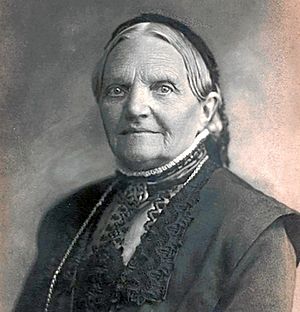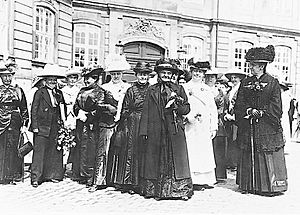Jutta Bojsen-Møller facts for kids
Jutta Bojsen-Møller (born Bojsen, 1837–1927) was an important Danish woman. She supported folk high schools, which are special schools for adults. She was also a strong supporter of women's rights. From 1894 to 1910, she led the Danish Women's Society, a group that worked for women's equality.
About Jutta Bojsen-Møller
Jutta Kunigunde Bojsen was born in Store Heddinge, a town on the Danish island of Zealand. Her father, Frederik Engelhardt Boisen, was a priest. Her mother, Eline Birgitte Heramb, was a writer.
In 1857, Jutta married Otto Ditlev Møller, who was also a priest. They had eight children together. Jutta was one of 11 children in her own family. She grew up in Skørpinge, near Slagelse, where her father became a priest. She and her siblings were taught at home by private teachers. Their education followed the ideas of Grundtvig, a famous Danish educator.
After her husband passed away in 1892, Jutta became a matron at a folk high school in Lyngby. A matron is like a headmistress or manager of the household. From 1905 to 1909, she worked at Rødkilde Højskole on the island of Møn. This school was started by her brother, Frede Bojsen.
Working for Women's Rights
Jutta became very interested in the women's movement. This happened because she was friends with the poet Jens Christian Hostrup and his wife Elisabeth. Both were active in the Danish Women's Society.
In 1894, Jutta joined the Danish Women's Society. She was encouraged by Astrid Hostrup, who was also a matron and a member of the society. Jutta was immediately chosen to be the president. She held this important role until 1910.
She quickly became interested in women's suffrage, which means women's right to vote. In 1898, she joined the Women's Society's Voting Rights Committee. For a while, getting women the right to vote was not the main goal of the society. But in 1906, Jutta and Louise Nørlund successfully made it an official goal.
Jutta worked hard to spread the Women's Society's influence across all of Denmark. While she was president, the number of members grew a lot, from 1,000 to 7,000. In 1915, thanks to the efforts of many people like Jutta, women in Denmark finally gained the right to vote.
Jutta Bojsen-Møller passed away in Copenhagen on January 12, 1927. She is buried in Lynge's old cemetery.
Awards and Recognition
In 1925, Jutta Bojsen-Møller received the gold Medal of Merit. This award recognized her important work and contributions to society.
See also
 In Spanish: Jutta Bojsen-Møller para niños
In Spanish: Jutta Bojsen-Møller para niños
 | Leon Lynch |
 | Milton P. Webster |
 | Ferdinand Smith |



